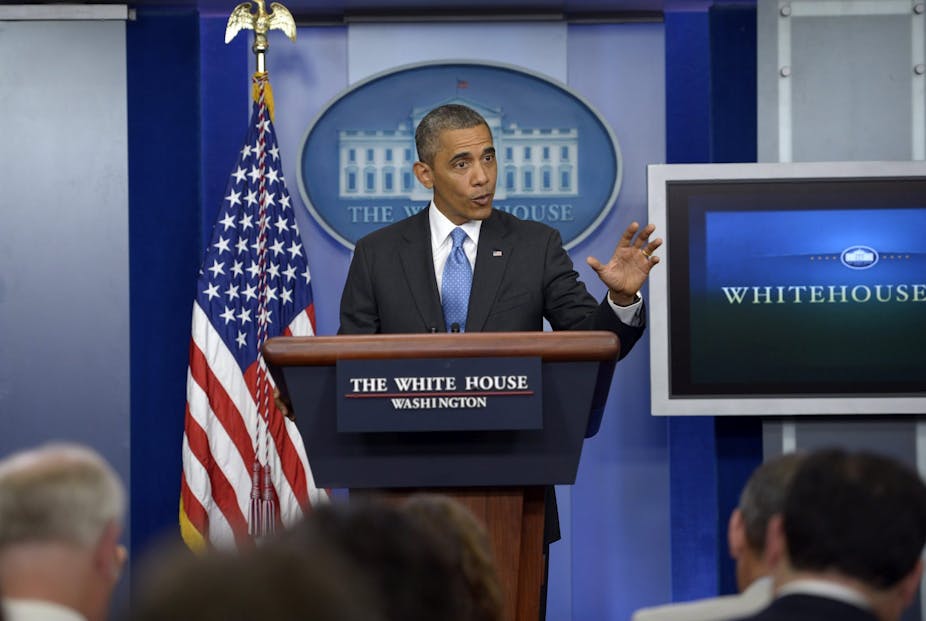Barack Obama’s “Trayvon Martin could have been me” speech has been heralded as a political landmark. American commentators have lauded its seamless fusion of different voices: “a president, an African-American, and…a former law professor”, all acquainted with the vulnerability of black youth, spoke as one. The trio adeptly explained why the George Zimmerman acquittal has sparked outrage, without directly criticising the verdict.
Striking as it was, the speech was not entirely unexpected. It’s a thoughtful coda to the “if I had a son, he’d look like Trayvon” address of March last year. And it echoed Obama’s controlled rage as he spoke alongside grieving Newtown parents, after Congress refused to pass stricter gun control laws. Meaningful action against the prevalence of firearms, and the circumstances that make people feel as if they need them, would surely stand as a satisfying legacy for Obama’s second term.
Intractable as those predicaments are, there’s reason for hope. The fate of youth is a potent rhetorical device.
In The Hanging Tree, historian Vic Gatrell examines why English public executions ended in 1868. The passing of what had been a popular source of entertainment began with the hanging of 14-year old John Amy Bird Bell. Bell was no Trayvon Martin. He had deliberately murdered a younger boy for money. And he wasn’t the first, or even the youngest child to be hanged in England. But, according the Gatrell, this was the first time that English society contemplated the body of a child swinging from a noose and thought: “is this how civilised societies should behave”?
Bell was made to be different, by no lesser figure than British politician and Australian colonial pioneer Edward Gibbon Wakefield. Gatrell credits Wakefield with instigating the abolition of public execution. Thinking about Wakefield’s story today after Obama’s speech, it seems likely that this leading figure in Australian history was driven by his own “I could have been Trayvon” moment.
In Wakefield’s poignant story of Bell’s dispatching, even the hangman was touched by a tiny teen who barely understood what was happening. Gatrell regarded this account as a watershed in political theatre; an effort to shift law with emotion-laced reason.
Wakefield was understandably fervent about crime and punishment: he’d served three years for kidnap. In a period where the poor were often hung for lesser sins, a “there but for the grace” shudder must have rippled through him at Bell’s demise. At any rate, his outrage at the injustices of the English penal system eventually contributed to a dramatic change in attitudes to the law.
While in opposition in the UK, David Cameron set about rebranding the Conservative Party, trying to connect with young victims of circumstance. While visiting Manchester to discuss the UK’s own problems with guns, Cameron’s entourage walked past a group of teenagers in hooded tops. One of them, a certain Ryan Florence, pretended to shoot the future prime minister. Amidst the outcry that followed, Cameron called for greater understanding of people like Florence, warning against stereotyping “hoodies”, in what became known as the “hug a hoodie” policy.

When journalists tracked Florence down, the errant teen scoffed at the idea that an old Etonian knew much about Manchester housing estates. But in my research with young people in neighbouring Liverpool, it did seem that Cameron was on to something. In that work, teenagers who identified as hoodies often spoke about feeling afraid. One young man told me that when he walked around in a black hood, it was usually because he just wanted to fit in with his peers. Nevertheless these young people knew the world viewed their style with suspicion, so in the end they just felt trapped.
Cameron’s problem was that he couldn’t muster that “could’ve been me” moment. But the knack of articulating the political present with youthful experiences has become a common electoral talent. The matter of what US presidential hopefuls did or did not do as young people (their war service or their drug habits, in Bill Clinton’s case) has featured in several elections over the last quarter of a century. The idea that political commitments depend on youthful moments where life could have taken a wrong turn has become a familiar motif.
Added to this, the accelerating reach of media has encouraged what sociologist James Stanyer calls a new form of intimate politics, and Obama is a master practitioner. Politicians are used to “letting us in” to their private lives, such that the ability to blend political and personal personae is a de facto requirement of office. According to Stanyer, nobody does it better than the 44th President of the United States.
So, the “Trayvon could have been me” speech pulsated with the history of political communication. Getting back to Gatrell, one of the motivations for his 600 plus page study is the fact that eventually opinion and law on public execution changed really quickly.
Will future historians write of a similar “Obama effect”?

